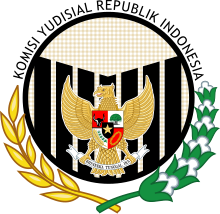| This article is part of a series on the |
| Politics of Indonesia |
|---|
 |

The Judicial Commission of Indonesia (Indonesian: Komisi Yudisial) was established as a consequence of the third amendment to the Constitution of Indonesia ratified by the Indonesian People's Consultative Assembly on 9 November 2001.[1] The Commission's duty is to monitor the performance of judges, advise the House of Representatives on judicial appointments and review community complaints about the behavior and fairness of presiding judges.[2]
History
The idea of a body to consider and give a final ruling on the appointment, promotion, transfer or dismissal of judges first arose in 1968 but failed to make the statute books. Pressure for the establishment of a body to bring about an honest, clean, transparent and professional legal system resurfaced in 1998 after president Soeharto resigned from office. On 9 November 2001, during its annual session, the People's Consultative Assembly passed the third amendment to the Constitution of Indonesia, mandating the establishment of a Judicial Commission. The proposal to establish the Judicial Commission was added into the amendment at the last minute and, in the view of some observers, the Commission was established in a hasty way.[3] On 13 August 2004, Law No. 22 on the Judicial Commission was promulgated and on 2 July 2005, the president officially appointed the seven members of the Commission. The members were sworn in by the president on 2 August 2005.[4][5]
Since its inception in 2005, most of the Commission's recommendations have been ignored by the Supreme Court. This has led the English-language publication the Jakarta Post to describe the Supreme Court as resistant to reform.[6]
Powers
The commission works to "maintain the honor, dignity and behavior of judges" and formerly held the power to propose candidates for the Supreme Court. Members are appointed by the president with the agreement of the House of Representatives.[7] The precise authority of the Judicial Commission, however, was not agreed upon by the different branches of the legal system in Indonesia.[8] It was reported in mid-2011, for example, that since its establishment in 2005 the Judicial Commission had summoned nine justices to be investigated for alleged ethics violations but that none had answered the summonses. Members of other branches of the legal system, such as Supreme Court judges, were reported to have taken the view that the Judicial Commission was exceeding its powers in attempting to summon judges in certain cases.[9]
The Commission suffered a major blow to its authority when the Constitutional Court in August 2006 granted a request filed by 31 judges of the Supreme Court to drop activities that gave the Commission the power to investigate alleged violations by Supreme Court and Constitutional Court justices. Following that decision of the Constitutional Court, it was agreed that the powers of the Judicial Commission needed to be clarified. Most recently, during 2011, the Indonesian House of Representatives had under consideration a revision to the 2004 Judicial Commission Law which would strengthen the powers of the Judicial Commission to directly punish high court and district court judges. Under the proposed changes to the law, however, the authority to punish Supreme Court justices would remain with the Supreme Court.[10]
In 2015, the Commission suffered a major blow to its powers when the Constitutional Court ruled in favor of a judicial review filed by the Indonesian Judges Association. The review alleged that selection of candidates for the bench was out of the Commission's purview, which only includes monitoring the performance of already serving judges.[11]
Members
The Judicial Commission consists of seven members drawn from former judges, legal practitioners, legal academics and community members.[2]
The current members for the Commission's 2020–2025 session are:
- Amzulian Rifai (Chairman)
- Siti Nurdjanah (Deputy Chairman)
- M. Taufiq HZ
- Binziad Kadafi
- Sukma Violetta
- Joko Sasmito
- Mukti Fajar Nur Dewata
References
- Denny Indrayana (2008) Indonesian Constitutional Reform 1999-2002: An Evaluation of Constitution-Making in Transition, Kompas Book Publishing, Jakarta ISBN 978-979-709-394-5
- A. Ahsin Thohari (2004) Judicial Commission and Judicial Reform, Institute for Policy Research and Advocacy, Jakarta ISBN 979-8981-35-9
- Judicial Commission Website
Notes
- ^ Denny Indrayana (2008), pp. 241, 266
- ^ a b Simon Butt, The Constitutional Court's Decision. Taken from Indonesia: Democracy and the Promise of Good Governance, pg. 186. Eds. Ross H McLeod and Andrew Macintyre. Singapore: Institute of Southeast Asian Studies, 2007. ISBN 9789812304599
- ^ Sebastiaan Pompe, 'The Judge S case why court oversight fails', The Jakarta Post, 13 June 2011.
- ^ Denny Indrayana (2008), pp. 241
- ^ Judicial Commission Website:Sejarah Pembentukan Komisi Yudisial (History of the Establishment of the Judicial Commission) access date 17 May 2009
- ^ Ina Parlina, Hope for effective judicial oversight pinned on new bill. Jakarta Post, 1 October 2016. Accessed 27 November 2016.
- ^ Denny Indrayana (2008), p267. For a report on the process of the selection of six new judges to the Supreme Court in 2011, see Ina Parlina, 'KY recommends 18 'quality' justice candidates to House' Archived 12 October 2012 at the Wayback Machine, The Jakarta Post, 2 August 2011.
- ^ See the useful discussion in Sebastiaan Pompe, op.cit.
- ^ Ina Parlina, 'Judicial Commission finds justices an elusive lot', The Jakarta Post, 16 July 2011.
- ^ Bagus BT Saragih and Ina Parlina, 'Debate on sanctions for judges stalls KY law enactment', The Jakarta Post, 21 July 2011.
- ^ Ina Parlina, Court ruling weakens Judicial Commission. Jakarta Post, 8 October 2015. Accessed 30 October 2016.









